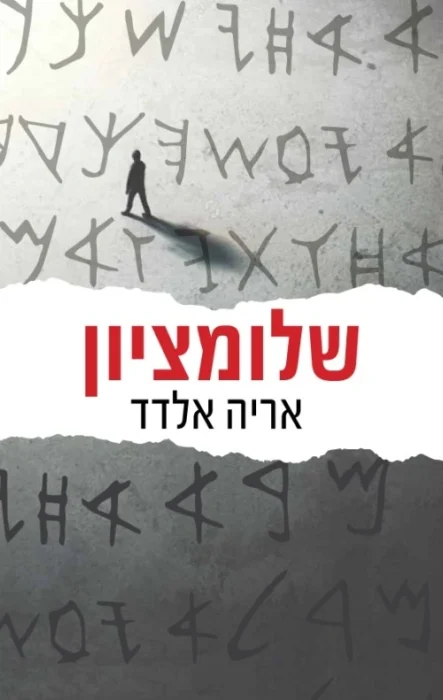Please scroll down for an English review.
יש ספרים שפותחים לא בציפייה, אלא בתקווה , כי משהו בהם מרמז על סיפור גדול שמתחבא בפנים
שלומציון של אריה אלדד היה כזה מבחינתי. וזה לא מקרה , כי הדמות ההיסטורית של שלומציון עצמה היא לא פחות ממסעירה.
הרעיון שבבסיס העלילה מסקרן: מרים קלפהולץ, ארכיאולוגית שהקריירה האקדמאית שלה אף פעם לא התרוממה ועוד יותר היא הלכה ודהתה, מוצאת בלוחות עתיקים את מה שנראה כמו תיעוד מהפכני של תקופת שלטונה של המלכה שלומציון. תקופה שאיכשהו כמעט ונמחקה מהתודעה.
שלומציון המלכה היא דמות מסקרנת ומרתקת. היא האישה היחידה ששלטה בפועל על ממלכת יהודה כמלכה עצמאית , ולא רק כאשתו של מלך. דבר נדיר מאוד בעת העתיקה, ובמיוחד בחברה פטריארכלית. היא עשתה את זה בתקופה סוערת, בין אגרופים של אחים חשמונאים וסכינים של פרושים וצדוקים.
בניגוד לדמויות נשיות מהמיתולוגיה או המקרא, שלומציון הייתה דמות ממשית עם השפעה מדינית ברורה , ובכל זאת, כמעט לא נכתבו עליה טקסטים.
לאורך השנים, חוקרים , ובעשורים האחרונים גם חוקרות , מנסים לשחזר את פועלה מתוך רסיסים. לדעת חוקרים רבים היא לא זכתה מספיק להכרה שמגיעה לה. לכן, היה מסקרן כיצד מרים קלפהולץ מתכננת להילחם על מקומה.
אבל במקום רומן היסטורי סוחף על גילוי מסעיר שמטלטל את הקאנון , קיבלתי טיוטה של תזה שעדיין מתלבטת מה היא רוצה להיות כשתגדל.
הספר נע בין כמה צירי עלילה: מרים והלוחות, המספר שמנסה לפענח את חידת חייו של אביו, ד"ר ישראל אלדד, ותעלומת קשרים שנרקמים סביב מחקר ארכיאולוגי שנחשב למפוקפק בעיני הממסד. הכול מתערבל , אבל לא מתאחד.
מרים, הדמות שכביכול אמורה להחזיק את מרכז הסיפור, מוצגת כאישה עיקשת, נואשת, אולי אפילו מהפכנית , אבל היא לא זוכה לעומק רגשי של ממש. אין רגע שבו הבנתי מה בדיוק הדליק אותה דווקא על שלומציון, מה בער לה להוכיח מלבד העובדה שהיא רצתה לקבל הכרה ושוב ושוב קיבלה דחייה מהאקדמיה.
והלוחות? אמורים להיות הסיפור הגדול, אבל הם נדחקים הצידה לטובת רפלקסיות, שברי זיכרון, ותחושת עמימות שלא משרתת את המתח , רק מדללת אותו.
יותר מכל , הסיום הוא זה שמרגיש כמו פספוס צורב. מרים פשוט… נעלמת. הקתרזיס לא מגיע.
לא כתגלית, לא כהתנגשות עם הממסד, לא כטרגדיה. פשוט נעלמת מעלילת הספר כמו שהיסטוריה שלמה נמחקת לפעמים , בשקט, בלי הסבר.
בשורה התחתונה?
וזה אולי מה שהכי מתסכל: זה לא ספר רע, אבל הוא פשוט לא מממש את הפוטנציאל שנמצא לו ממש מתחת לאף , כאילו בחר לחפור במקום שברור שאין בו שום זהב.
"שלומציון" יכל להיות ספר חשוב על אישה שלא זכתה למקום המגיע לה. ההקבלות לדמותה של מרים, יכלו לשאת את העלילה למקומות אחרים.
שאלות על זיכרון, אמת, דחייה, ותשוקה להכרה יכלו להניע את העלילה , אבל הן לא.
במקום זה קיבלתי סיפור שמתנהל על קצות האצבעות, לא באמת הולך עד הסוף, ונשאר בגדר הבטחה לא ממומשת.
לא רע , פשוט מאכזב.
(כמו למצוא חרס עתיק ולגלות שזה שבר של עציץ פלסטיק מודרני. יפה, אבל לא זה שחיפשת.)
שלומציון/ אריה אלדד
הוצאת עצמית, 2022, 392 עמ'
דירוג SIVI –
איכות אודיו –

How a brilliant idea somehow never quite takes off
Some books open not with expectation but with hope, because the premise is intriguing, hinting at greatness.
Shlomtzion by Aryeh Eldad was precisely that for me. And rightly so, the historical figure of Queen Shlomtzion is nothing short of fascinating.
The story’s premise is compelling: Miriam Kalpholz, an archaeologist whose academic career is fading, discovers ancient tablets that seem to reveal a revolutionary account of Queen Shlomtzion’s reign —a chapter in Jewish history that has somehow been nearly erased from collective memory.
Shlomtzion is a rare and captivating figure. She is the only woman to have ever ruled the kingdom of Judea as a sovereign queen, not as a consort, which is remarkable in a patriarchal ancient world. She held power during one of the most chaotic periods in Jewish history, caught between the fists of feuding Hasmonean brothers and the blades of sectarian conflict.
Unlike mythological or biblical heroines, Shlomtzion was a real historical force. Yet few texts were written about her. Over the years, scholars—and more recently, female scholars- have tried to reconstruct her legacy from fragmented sources. For many, she’s a symbol of neglected greatness. So I was intrigued: How would Miriam, whose own voice has been silenced by academia, fight to restore the voice of a silenced queen?
But instead of an electrifying historical novel about a discovery that rocks the establishment, what I got felt more like a hesitant thesis draft that hasn’t quite figured out what it wants to be.
The book shifts between narrative lines: Miriam and the tablets, the narrator unraveling the mystery of his father (Dr. Israel Eldad), and the political intrigue surrounding a controversial archaeological dig. These threads swirl around, but never truly weave together.
Miriam, supposedly the novel's core, is presented as stubborn, desperate, and maybe even radical, but she lacks real emotional depth. I never fully understood why she was drawn so powerfully to Shlomtzion or what personal fire drove her obsession. It seems all she truly wanted was validation from an academic world that kept rejecting her.
And the tablets? Supposedly, the heart of the mystery, they fade into the background, replaced by musings, memory fragments, and a foggy atmosphere that doesn’t heighten suspense but weakens it.
Above all, the ending felt like a missed opportunity. Miriam… vanishes, no discovery, no clash with the establishment, no tragedy. She disappears from the novel the way entire histories sometimes vanish, silently, without explanation.
Bottom line?
Shlomtzion could have been a powerful novel about a woman forgotten by history. The parallels between Miriam and the queen could have driven the narrative into bold, layered territory.
Questions of memory, truth, rejection, and the hunger for recognition could have propelled the story forward, but they didn’t. Instead, we’re left with a book that tiptoes around its themes, never fully committing. It's not a bad book, just a disappointing one.
(Like finding an ancient shard, only to realize it’s a broken piece of plastic flowerpot. Pretty, but not what you came for.)
לגלות עוד מהאתר Sivi's Books
Subscribe to get the latest posts sent to your email.

